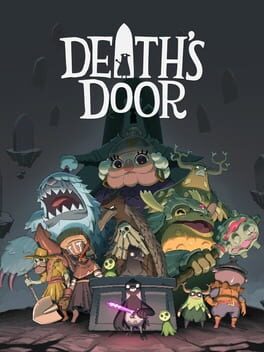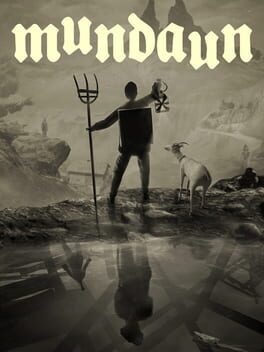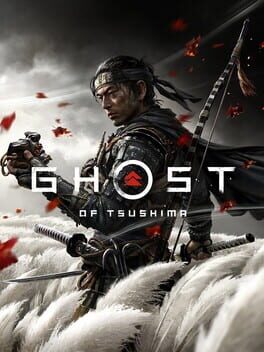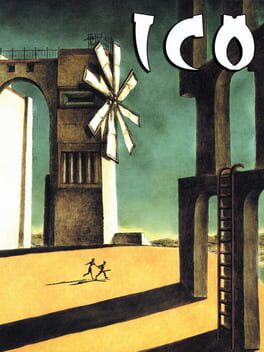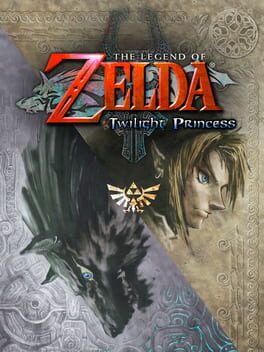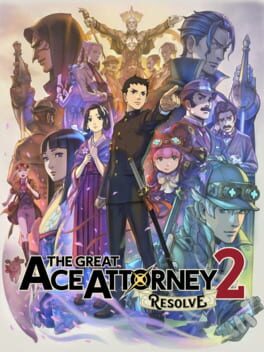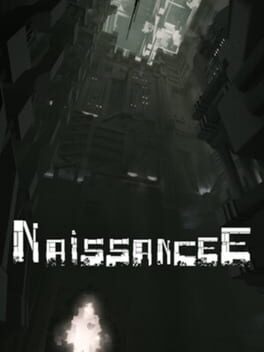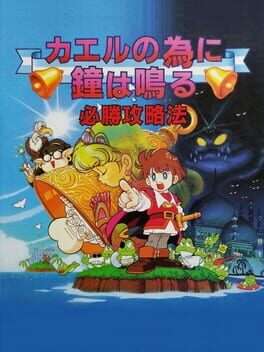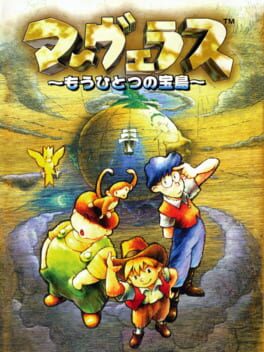rumnikub
45 reviews liked by rumnikub
Death's Door
2021
Death is so easy in videogames. We flow through it - make it mundane - in order to experience the editing process of our playthroughs, shedding layers to further reach a win-state. The summer is coming to a close and sometimes I can't be arsed to play Dark Souls again so I boot up games that just lend themselves to us, perfectly understandable and playable in every aspect. Death's Door is something like that. It's difficult to attack smoothness. You just run your hand on it and slip. But it's sweet. You do it again. Until you find yourself one night having finished the game to near completion in the ten hours that you had to spare somewhere between now and the outside noise.
The older I get and the more difficult I find it to deny the pleasures of "relaxing" games. The last time I refused myself like this was probably A Short Hike. If games are to be put on the same pedestal as other art forms - as they should, sometimes, as they won't, fortunately - then we have to acccept that they too must reflect a vastness and breadth of experiences larger than our own limited scopes. The human experience, baby. Not every game is meant for y'all and accessibility is important. Representation matters. Sometimes a game is just a game. Each one of these statements is "factually" (meaning morally) correct.
To say that I felt nothing while playing Death's Door would be factually wrong. The art, the music, the story, the difficulty, the secrets and mechanics all blend together in the primordial goop of "goodness". The only thing was that for a game named Death's Door, it doesn't contain much if any death at all. Your dodge/attack window is generous and unburdened by consequences as you don't loose any souls for failing your progress. Eventually you kill the Big Bad, Lord of Doors, Committer of the Greatest Sin in all of Videogames : To be a Gatekeeper.
You break the cycle. Freeing yourself from the bondage of serfdom, you live the rest of your days surrounded by your community of crows - wholesome reapers now without jobs. You embrace Death, without having ever truly grazed it in the first place. You beat the game.
It's my fault and not the game's for asking all these questions. Game doesn't care. Game just requires to be played - or better yet, observed. I, for one, am just grumbling. But like I said I didn't have a bad time with Death's Door. I did, after all, finish the damn thing. It might come as a surprise to some that I adore videogames - there's no trick to that. I'm enamoured with their worthlessness. They rarely make me raise an eyebrow, but then again they so often do. Death's Door makes sure that I can detect every part of itself. That I can wholeheartedly play it to bear witness and remember fondly on the time a Pothead Knight asked me if I wanted some soup. Or when a mindflayer latched onto me for a midnight quest.
My favorite part of Death's Door actually came after the game. The Dead Lord leaves a key to a Rusty Belltower that calls forth a night on the whole map. The music ceases along with the enemies, leaving room for an endgame made of missing shrines and stone tablets. I don't care much for true platinums and epilogues. But here's a terrain suddenly emptied in a quiet, serene levels that I can walk through to the sound of owls, no longer forced to engage much or activate my facilities as a gamer in order to progress. I've earned this, have I not ?
Mindful practices. Games should never be nice. They can be devoted, hearthrobbing or even joyful but never nice. What's the use of nice ? What functions does nice serve and how do you feel once niceties have been applied to you ? By you ?
Kindness, now here's the real kicker. The hard one. The one that requires commitment. Kindness requires sacrifice. Kindness - to their player, to themselves - is something videogames often prove incapable of handing. And yet we talk in the language of care, of inclusivity and adjectives. Of hyperbole. Death's Door is not a social justice game but it sure is a progressive one. This review could have been about any number of games but I chose Death's Door because its essential narrative boils down to that : The system can be undone if you embrace change to the song of old flutes and nice dungeons. Convenient ones. It's important to accept the inevitability of your own death xx. I write these words and they're probably read as highly irritated. But the truth is I'm mostly typing them in a pout. Dark Souls didn't die for this shit. I don't mind the fancy aesthetics. For example there's this game called Going Under that, while a little blunt, perfectly captures the hellscape of wholesomeness. Of saying things while not really saying anything at all. The contained chaos of that thought alone. What happens then is that the conversation ends and everybody goes home having played "a really good game".
It's not everyday Maximalist Country in this hoe. Sometimes a game is just a game, I know. But that's a little disappointing, isn't it ?
The older I get and the more difficult I find it to deny the pleasures of "relaxing" games. The last time I refused myself like this was probably A Short Hike. If games are to be put on the same pedestal as other art forms - as they should, sometimes, as they won't, fortunately - then we have to acccept that they too must reflect a vastness and breadth of experiences larger than our own limited scopes. The human experience, baby. Not every game is meant for y'all and accessibility is important. Representation matters. Sometimes a game is just a game. Each one of these statements is "factually" (meaning morally) correct.
To say that I felt nothing while playing Death's Door would be factually wrong. The art, the music, the story, the difficulty, the secrets and mechanics all blend together in the primordial goop of "goodness". The only thing was that for a game named Death's Door, it doesn't contain much if any death at all. Your dodge/attack window is generous and unburdened by consequences as you don't loose any souls for failing your progress. Eventually you kill the Big Bad, Lord of Doors, Committer of the Greatest Sin in all of Videogames : To be a Gatekeeper.
You break the cycle. Freeing yourself from the bondage of serfdom, you live the rest of your days surrounded by your community of crows - wholesome reapers now without jobs. You embrace Death, without having ever truly grazed it in the first place. You beat the game.
It's my fault and not the game's for asking all these questions. Game doesn't care. Game just requires to be played - or better yet, observed. I, for one, am just grumbling. But like I said I didn't have a bad time with Death's Door. I did, after all, finish the damn thing. It might come as a surprise to some that I adore videogames - there's no trick to that. I'm enamoured with their worthlessness. They rarely make me raise an eyebrow, but then again they so often do. Death's Door makes sure that I can detect every part of itself. That I can wholeheartedly play it to bear witness and remember fondly on the time a Pothead Knight asked me if I wanted some soup. Or when a mindflayer latched onto me for a midnight quest.
My favorite part of Death's Door actually came after the game. The Dead Lord leaves a key to a Rusty Belltower that calls forth a night on the whole map. The music ceases along with the enemies, leaving room for an endgame made of missing shrines and stone tablets. I don't care much for true platinums and epilogues. But here's a terrain suddenly emptied in a quiet, serene levels that I can walk through to the sound of owls, no longer forced to engage much or activate my facilities as a gamer in order to progress. I've earned this, have I not ?
Mindful practices. Games should never be nice. They can be devoted, hearthrobbing or even joyful but never nice. What's the use of nice ? What functions does nice serve and how do you feel once niceties have been applied to you ? By you ?
Kindness, now here's the real kicker. The hard one. The one that requires commitment. Kindness requires sacrifice. Kindness - to their player, to themselves - is something videogames often prove incapable of handing. And yet we talk in the language of care, of inclusivity and adjectives. Of hyperbole. Death's Door is not a social justice game but it sure is a progressive one. This review could have been about any number of games but I chose Death's Door because its essential narrative boils down to that : The system can be undone if you embrace change to the song of old flutes and nice dungeons. Convenient ones. It's important to accept the inevitability of your own death xx. I write these words and they're probably read as highly irritated. But the truth is I'm mostly typing them in a pout. Dark Souls didn't die for this shit. I don't mind the fancy aesthetics. For example there's this game called Going Under that, while a little blunt, perfectly captures the hellscape of wholesomeness. Of saying things while not really saying anything at all. The contained chaos of that thought alone. What happens then is that the conversation ends and everybody goes home having played "a really good game".
It's not everyday Maximalist Country in this hoe. Sometimes a game is just a game, I know. But that's a little disappointing, isn't it ?
The Beginner's Guide
2015
Anyone who claims The Beginner's Guide not to be a game has never played a game.
They may have watched a playthrough unfold before their eyes, one whose inputs coincidentally came from the same brain watching it. But they didn't play it. Because in order to understand The Beginner's Guide as something other than a game, one has to go through the same process as someone who can't see essays as literature: games are, for these people, either fun-generating machines or vessels for Narratives, which in turn have Messages, but never a language unto itself.
When The Beginner's Guide meditates on game design conventions, axioms and the interplay between intent, message, execution, apprehension and interpretation -- and does so through layers of that same interplay -- it generates meaning not because of what it says, but because of what it does. The fact that the experience is guided by a voice is orthogonal to the fact that you have to play it to get anything out of it -- that is, to use the many syntaxes the game establishes to navigate the world, the stories and the mechanics. Only then, The Beginner's Guide becomes a conversation, not a guided tour.
Every instruction is a negotiation when you're playing a game, even if you end up following it. The mediator of the negotiation is not Coda or the narrator, but your own curiosity about these characters and what they have built.
They may have watched a playthrough unfold before their eyes, one whose inputs coincidentally came from the same brain watching it. But they didn't play it. Because in order to understand The Beginner's Guide as something other than a game, one has to go through the same process as someone who can't see essays as literature: games are, for these people, either fun-generating machines or vessels for Narratives, which in turn have Messages, but never a language unto itself.
When The Beginner's Guide meditates on game design conventions, axioms and the interplay between intent, message, execution, apprehension and interpretation -- and does so through layers of that same interplay -- it generates meaning not because of what it says, but because of what it does. The fact that the experience is guided by a voice is orthogonal to the fact that you have to play it to get anything out of it -- that is, to use the many syntaxes the game establishes to navigate the world, the stories and the mechanics. Only then, The Beginner's Guide becomes a conversation, not a guided tour.
Every instruction is a negotiation when you're playing a game, even if you end up following it. The mediator of the negotiation is not Coda or the narrator, but your own curiosity about these characters and what they have built.
Mundaun
2021
Usually when I talk to others who have played this game, we come to the conclusion that it's "an adventure game with horror in it" and that horror is typically a deep sense of dread. That dread is well written in to the story of the game, in which I feared for the town, the people and myself while uncovering the mysteries within Mundaun. I could always feel like worse and worse things would happen in this world, and that there could not be a resolution.
The art style is the immediate selling point of this game, although everything else about it is fantastic. I thought the black-and-white / sepia tones would be boring or ugly to look at for hours, but it is both unique and has been beautifully used throughout lands. There is a distinction between regions you enter and the skybox is typically always visible and gorgeous.
Beyond the artistic choice, what gives this game outstanding visual style is how that the way the player is drawn to environmental scripted moments. There are things that happen throughout the game that you could miss if you weren't watching, and I almost did, but there is a particular way these moments pop out of the background, or the players focus gets pulled to them. I don't know how to explain it, but when these moments happen it is startling and mesmerizing!
Mechanically, the game is a simple adventure, with an appropriate amount of verbs and interactions the player can make. It leans minimally on a survival-horror genre, with limited supplies to use against enemies, but doesn't rely entirely on them. I ended up exploring as much as I could, not because of collecting but because I was craving more storytelling.
This game is also really fun! I enjoyed driving around, meeting new people and walking around the world. I'm not big into adventure game puzzles as I can find them either too easy and boring or too difficult and frustrating. Mundaun found a happy-medium, where every next objective was explained when necessary. If I found something I could interact with and didn't understand, I would eventually be told how I could use it when needed. I didn't end up backtracking a lot to figure out if I forgot or missed something, it wasn't much and did not feel like a chore, as the vehicle is fun, the land is nice to look at, and the creepiness of some environments is pleasant to pass through.
Mundaun is a wonderful game, and after beating it, wanted to revisit for another possible ending - or just to be in this world again, find the secrets I may have missed and be amazed by the visual moments I may have forgotten about. I can't recommend this game enough.
The art style is the immediate selling point of this game, although everything else about it is fantastic. I thought the black-and-white / sepia tones would be boring or ugly to look at for hours, but it is both unique and has been beautifully used throughout lands. There is a distinction between regions you enter and the skybox is typically always visible and gorgeous.
Beyond the artistic choice, what gives this game outstanding visual style is how that the way the player is drawn to environmental scripted moments. There are things that happen throughout the game that you could miss if you weren't watching, and I almost did, but there is a particular way these moments pop out of the background, or the players focus gets pulled to them. I don't know how to explain it, but when these moments happen it is startling and mesmerizing!
Mechanically, the game is a simple adventure, with an appropriate amount of verbs and interactions the player can make. It leans minimally on a survival-horror genre, with limited supplies to use against enemies, but doesn't rely entirely on them. I ended up exploring as much as I could, not because of collecting but because I was craving more storytelling.
This game is also really fun! I enjoyed driving around, meeting new people and walking around the world. I'm not big into adventure game puzzles as I can find them either too easy and boring or too difficult and frustrating. Mundaun found a happy-medium, where every next objective was explained when necessary. If I found something I could interact with and didn't understand, I would eventually be told how I could use it when needed. I didn't end up backtracking a lot to figure out if I forgot or missed something, it wasn't much and did not feel like a chore, as the vehicle is fun, the land is nice to look at, and the creepiness of some environments is pleasant to pass through.
Mundaun is a wonderful game, and after beating it, wanted to revisit for another possible ending - or just to be in this world again, find the secrets I may have missed and be amazed by the visual moments I may have forgotten about. I can't recommend this game enough.
Ghost of Tsushima
2020
Ghost of Tsushima
2020
appropriate in many ways as the apex of open world game design this generation, hysterical in others. on the one hand it's one of the blandest and most by the numbers maps i've ever seen. on the other hand the crux of the narrative revolves around the main character making the hard choice to do stealth kills instead of "Go Loud." sadly the latter aspect isn't funny enough to carry it
Ghost of Tsushima
2020
Coming from a native japanese person, this game is oblivious to actual japanese history. It dances with fantasies of japanese stereotypes like "honor" while ignoring the undercurrent of actual samurai life, which is both far less honorable and far more mundane than depicted. It would be one thing if this was designed to be fantastical, but it isn't. Sucker Punch designed this game with the goal of accurately portraying Japan's culture and history, and they failed at that. To say otherwise would be a disservice to the memory of the samurai themselves.
Besides, the game is just bland open world AAA kitsch with a big map and picturesque locations made by crunching underpaid developers and artists. Which is to say, it's a game that isn't bad, but isn't memorable either. A game that entices the senses but never the imagination, that gives the illusion of enjoyment while leaving you empty in the end. It's a AAA game in 2020 and that's all I really have to say.
Besides, the game is just bland open world AAA kitsch with a big map and picturesque locations made by crunching underpaid developers and artists. Which is to say, it's a game that isn't bad, but isn't memorable either. A game that entices the senses but never the imagination, that gives the illusion of enjoyment while leaving you empty in the end. It's a AAA game in 2020 and that's all I really have to say.
Ghost of Tsushima
2020
Ico
2012
The simple act of holding hands is key to a bond between boy and girl that transcends their language barrier. With no HUD, no life bar, no button prompts, and no tutorials, Ico is the purest experience in all of gaming. You discover everything for yourself, with nothing to break your immersion. The castle the game takes place in is a character unto itself, your prison and biggest obstacle, with such a well thought out interconnected design.
A game absolutely everyone should play to open their eyes to the power of the medium for storytelling, a landmark in gameplay-story integration.
A game absolutely everyone should play to open their eyes to the power of the medium for storytelling, a landmark in gameplay-story integration.
Portal 2
2011
6 lists liked by rumnikub
by Lehuan |
99 Games
by chump |
250 Games
by AuthorMx |
80 Games
by StatisticsMan |
250 Games
by StatisticsMan |
50 Games
by Pooky |
567 Games
